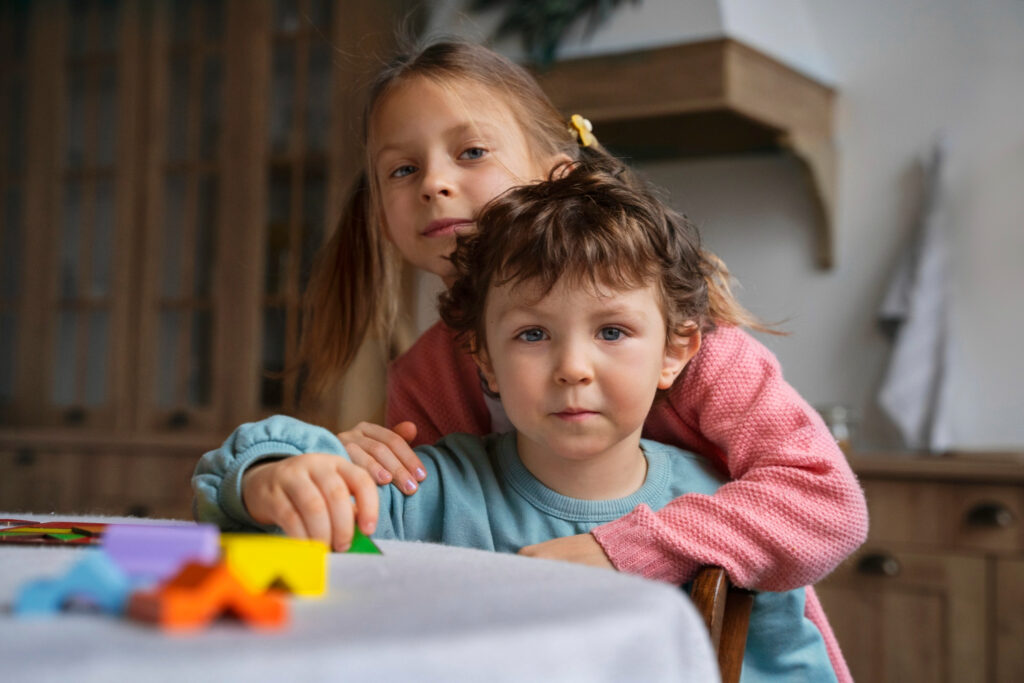When a child is diagnosed with Autism Spectrum Disorder (ASD), it doesn’t just impact that child—it affects the whole family. Siblings of children with autism can experience a wide range of emotions and challenges. At HOPE Centre for Autism, we understand the importance of supporting not just the child with autism but also their siblings, who play a critical role in the family dynamic.
In this blog, we’ll explore the unique experiences of siblings of children with autism and provide strategies for parents to offer them the support they need.
Understanding the Sibling Experience
Siblings of children with autism often face unique challenges. These can range from feeling overshadowed or confused by their sibling’s needs to experiencing frustration or resentment due to the extra attention their sibling may require. At the same time, many siblings develop empathy, patience, and understanding as a result of their experiences.
Common emotions and challenges for siblings of children with autism include:
- Feeling left out: Siblings may feel that their needs are not being met or that their concerns are less important than those of their sibling with autism.
- Confusion: Younger siblings may not fully understand what autism is, leading to confusion about why their brother or sister behaves differently.
- Frustration or resentment: It’s common for siblings to feel frustrated when they have to make sacrifices or take on additional responsibilities.
- Guilt: Some siblings may feel guilty for having negative feelings toward their sibling or for being able to do things their sibling with autism cannot.
- Protectiveness: Many siblings develop a strong protective instinct toward their brother or sister with autism, wanting to shield them from harm or bullying.
Strategies to Support Siblings
Supporting the emotional and social needs of siblings is just as important as addressing the needs of the child with autism. Here are some ways parents can ensure their other children feel valued, heard, and supported.
1. Provide Open and Honest Communication
It’s important to talk openly about autism with all of your children. Use age-appropriate language to explain what autism is and how it affects their sibling. Encourage them to ask questions and express their feelings. Open communication helps siblings understand that it’s okay to have mixed emotions.
At HOPE Centre for Autism, we offer resources to help families discuss autism in a way that fosters understanding and empathy among siblings.
2. Give Individual Attention
Siblings of children with autism may feel overlooked due to the amount of time and energy parents need to devote to their child with special needs. It’s crucial to set aside one-on-one time with each sibling, allowing them to feel valued and acknowledged. This special time can be used for activities they enjoy or just to listen to their concerns.
3. Encourage Sibling Involvement
Involving siblings in their brother or sister’s therapy or daily routines can foster a sense of connection and responsibility. However, it’s important not to place too much pressure on siblings to act as caregivers. Instead, find simple ways for them to participate in family activities that include their sibling with autism, such as playing games or helping with tasks they can manage.
At HOPE Centre for Autism, we encourage family-centered approaches that help siblings bond and understand their sibling’s experiences.
4. Acknowledge and Validate Their Feelings
Siblings need to know that it’s okay to feel a range of emotions, from love and compassion to frustration and sadness. Let them know their feelings are valid and normal. Sometimes siblings may feel guilty for having negative emotions, but acknowledging these feelings can prevent them from bottling up their frustrations.
5. Provide Sibling Support Groups
Connecting with other siblings who have brothers or sisters with autism can be incredibly beneficial. Sibling support groups provide a space for children to share their experiences, gain insight from others in similar situations, and feel less alone. These groups can also offer practical tips for managing the unique challenges of having a sibling with autism.
At HOPE Centre for Autism, we can help guide families toward resources, including sibling support groups, that foster community and shared understanding.
6. Celebrate Their Achievements
Siblings may sometimes feel that their achievements are overshadowed by their sibling’s needs. Be sure to celebrate their accomplishments and recognize their strengths. Whether it’s academic success, sports achievements, or personal milestones, acknowledging their successes helps siblings feel valued and appreciated.
7. Teach Problem-Solving and Coping Skills
Siblings may need help developing coping strategies for handling stressful situations related to their sibling’s autism. This might include learning how to manage their emotions when their sibling has a meltdown or understanding how to communicate effectively with their sibling. Teaching problem-solving and coping skills equips siblings with tools to navigate these challenges in a healthy way.
Building a Strong Family Bond
The sibling relationship is one of the most important and lasting relationships in a child’s life. By providing the right support and understanding, parents can help siblings of children with autism build strong, positive bonds. This not only enhances the family dynamic but also teaches all children empathy, resilience, and the value of unconditional love.
At HOPE Centre for Autism, we believe that supporting the entire family is key to helping children with autism thrive. We offer resources, therapies, and programs designed to support both children with autism and their siblings, ensuring a harmonious and supportive family environment.
Conclusion
Siblings of children with autism often face unique emotional challenges, but with the right support, they can develop strong coping skills and a deep sense of empathy. By fostering open communication, giving individual attention, and encouraging sibling involvement, parents can ensure that all of their children feel valued and understood.
If you’re looking for more guidance or support for your family, contact HOPE Centre for Autism. We’re here to help every member of your family navigate the autism journey together.
